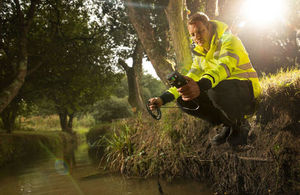National Drought Group – Chairman’s Statement – September 2018
The NDG convened on Thursday 20 September to assess the present situation and review the action being taken to reduce the risk of drought in 2019.

The National Drought Group confirmed that there is no threat to essential water supplies, but a drier than average winter would bring the risk of restrictions on water company customers
The National Drought Group (NDG), chaired by Environment Agency Chief Executive Sir James Bevan, brings together government departments, water companies, environmental groups and others to coordinate action to maintain water supplies and manage the other risks associated with drought.
The NDG convened on Thursday 20 September to assess the present situation and review the action being taken to reduce the risk of drought in 2019.
CURRENT SITUATION AND PROSPECTS:
The National Drought Group noted that despite recent rainfall and cooler weather, a significant number of reservoirs in the area around Manchester, Sheffield and Stoke-on-Trent are very low. United Utilities, Yorkshire Water and Severn Trent Water are all taking action to reduce water taken from these sources. It is unlikely that restrictions on customers will be used this autumn.
Recent heavy rainfall across Cumbria has improved the water resources situation for some reservoirs operated by United Utilities. However, there is continuing localised drought risk in some areas of the Pennines, Yorkshire, Manchester, Sheffield, Stoke and parts of central England.
Water companies need higher-than-average rainfall over the next few months to ensure good water supplies next spring and summer, and avoid the risk of water restrictions then.
ACTION TO BE TAKEN:
The water companies set out the action they will be taking to meet this challenge. This includes putting more resources into efforts to reduce leakage, seeking to capture and store as much water as possible going into the autumn, exploring the opportunities for water transfers between companies, improving and implementing their drought plans and other operational contingency measures. The action also covers preparing applications for drought permits should these prove necessary in the coming months, and continuing to communicate with customers the latest water resources position and encouraging their customers to use water wisely, including by encouraging moves to more metering.
The Environment Agency confirmed that it will sustain its enhanced activity to seek to ensure water users and the environment get the water they need and:
- Ensure they are responding quickly to emergencies
- Work with the water companies to ensure they are following their drought plans and implementing all agreed actions in a timely way
- Work proactively with farmers and other water users who abstract water under licence from the Environment Agency to seek to ensure they get the water they need whilst sustaining environmental needs
- Continue to actively monitor the weather, water situation and the environment. Manage down demand and protect the environment, using regulatory powers as necessary
- Assist the Canal and Rivers Trust with water supplies for canal networks to avoid impacts to those who use canals for homes
- continue to operate its own water transfer schemes where necessary to maintain river flows for water supply and the environment
- Communicate with those who use the environment to help identify potential impacts as quickly as possible
- Continue to respond to drought-related and other environmental incidents
The Environment Agency is working actively with the water companies and others to balance the needs of the public, industry and farmers, and the environment; and to ensure long-term water resilience. Following the National Drought Group, Sir James Bevan will chair the first steering group meeting of the water national water resources framework meeting, which will look at long-term pressures facing all sectors, and how to express these to ensure greater water resilience in the future.
Other NDG members set out the action they will be taking to preserve water supplies, sustain economic and leisure activity and protect as far as possible the environment, rivers, lakes and wildlife.
CONCLUSIONS AND NEXT STEPS
The NDG confirmed that there is no threat to essential water supplies. But a drier than average winter would bring the risk of restrictions on water company customers. It would also prove another challenging summer for farmers next year and cause further environmental impacts across the country. NDG members agreed to continue to work together to manage down these risks in the short to medium term and to balance the needs of people, the economy and the environment; and to work collaboratively to enhance the country’s long-term resilience to drought and water shortages.
The NDG will meet again on 19 November to take stock and agree any further necessary measures going into winter.